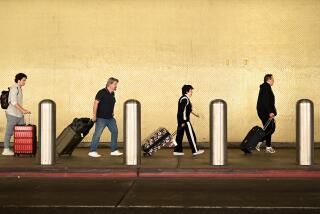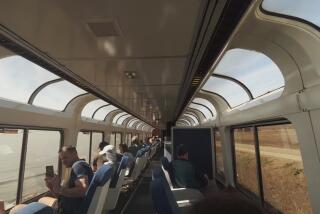Getting a Good Night’s Sleep, Even on the Road : Aromas and sunlight figure in some of the newer strategies for encouraging slumber.
- Share via
First-class passengers on Air New Zealand are offered more than blankets and pillows to ease the effects of long-distance trips without much sleep. They get a “Revival on Arrival” flight kit. Inside are two bottles, one labeled “Awake” and the other “Asleep,” containing a blend of fragrances made from plant-based oils.
When trying to stay awake after they land, they use the appropriate aromatherapy in a bath or shower (or dab it on a handkerchief and inhale), according to an airline spokeswoman. They use the opposite formula when trying to fall asleep.
Some sleep experts aren’t convinced that aromatherapy works. But airline officials say the public response has been positive, with passengers grateful for the effort to remedy an age-old problem: the disruption of sleep during and after long-distance travel and the difficulty many people have in sleeping away from home.
“Jet lag affects about three out of four (long distance) travelers,” said Michael Stevenson, a psychologist and clinical director of the North Valley Sleep Disorders Center in Mission Hills. But jet lag is just one of the sleep-related problems associated with the difficulties of getting a good night’s sleep on the road.
As scientists learn more about the workings of our internal clocks, they can recommend measures to help us arrive at our destinations feeling refreshed. To help us cope with travel-related sleep problems, including jet lag and its prevention, some experts now recommend resetting our clocks by using light therapy, diet, exercise, short-term medication or a combination of those approaches.
“When your body wants to sleep and you want to stay awake, go out in the sun,” Stevenson tells travelers. “That will help you move to the other time zone.” This light therapy will reset your clock to the destination time, he explained, because light normally helps your brain know what time it is.
When you arrive at your destination, stay up if it is not bedtime there, Stevenson said. Go to a sidewalk cafe for breakfast. Soak up sunlight. “If you fly from west to east, you want to wake up earlier, so be sure you get lots of sun early in the morning,” Stevenson said. If you fly from east to west, he advised getting sun late in the afternoon to help reset the internal clock.
Such use of light therapy, Stevenson said, stems from studies in which researchers discovered that military infantrymen, outside much of the day, adjusted more rapidly than commanding officers, who were involved in war-time strategy sessions inside the bunkers. More recent studies have also proved the value of natural light therapy.
Avoiding excessive caffeine or alcohol, as well as long naps, can minimize travel-related sleep problems, too, Stevenson said. Once you arrive, seek out others. “Interaction with other people who are on the other (destination) time zone can help,” he said. Picking up on their energy, or lack of it if they are winding down for sleep, can be infectious, he said.
Sleeping pills can help some travelers get a good night’s sleep, said Dr. Stuart Yudofsky, professor and chairman of psychiatry at Baylor College of Medicine, Houston, and co-author of “What You Need To Know About Psychiatric Drugs” (Ballantine, $14).
Judicious use is the key, agreed Yudofsky and Stevenson. “Some travelers do well on Halcion (triazolam),” Yudofsky said. “Others have severe problems with amnesia.” The use of Halcion is highly controversial. Some experts claim it can cause violent behavior; others claim it is safe when prescribed and taken properly.
Before Yudofsky prescribes a sleeping pill for use during travel, he prefers that his patients take the pill on a trial basis during a period in which the patients are not traveling. Then he closely monitors the person, assessing performance the next day and, in particular, watching for memory lapses. “I do not make the trip the experiment,” he said. Some travelers use sleeping pills two or three times a year during long-distance trips very successfully, he said.
Computer-based programs have also sprung up to help long-distance travelers reset their clocks. The programs take into account flight times and other factors and then make pre-trip recommendations about when to sleep, eat and exercise. One, Jet-Ready, is based in part on the anti-jet lag diet developed by Charles Ehret, said Bill Ashton, president of Jet-Ready Travel Services in Woodside, Calif.
Used mostly by travel agents as an extra service to clients, Jet-Ready analyzes information such as flight times, connections and the traveler’s schedule, Ashton said, before producing a printout of specific recommendations. On some days, for instance, the program recommends large meals; other days it recommends light meals. It tells travelers when to avoid bright light and when to seek it to help reset the clock and it recommends specific activity or exercise times. (For information, call 415-851-4484.)
Another computer program, TimeZone, is designed for individual use on IBM-compatible computers, according to Alan Cameron, president of Management Consulting/International Co. in Irvine, which introduced the $69.95 program last year. (For more information, call 714-552-4660.) The program prints out recommendations for diet, light exposure and sleep for the day before the trip, during the trip and the destination day, he said.
Once at your destination, common sense measures can also help minimize sleep disruption. Good sleep hygiene is vital, Stevenson said. Wind down an hour or so before you plan to retire, he suggested. If you can’t sleep once you’re settled in bed, “don’t thrash around for hours. Get up if you can’t sleep.”
To induce sleep in an unfamiliar environment, Stevenson suggested taking along a “white noise” generator--a machine that emits a mixture of sound waves to mask out unwanted noise interfering with sleep). Sharper Image now carries a travel-size version, about the size of a hardcover book, for $99.95.
Or, take along a personal stereo headset with ocean surf tapes or other repetitive, relaxing sounds, Stevenson said. He sometimes packs his pillow, which he says is finally broken in after years of use, but he acknowledges that such accouterments are not always practical. Light packers might consider toting smaller items, such as a sleep mask to help encourage slumber on the plane or at the destination, he said. Earplugs can help block out noise.
Don’t overlook good, common-sense planning. “Try to get a room away from noise,” Stevenson suggested. Ask specifically for a room that does not face busy streets and is away from elevators, staircases and ice machines.
Although Stevenson concentrates on the science of sleep, he knows psychology can play a role and is open to remedies that other experts might dismiss. Does that include the “Awake” and “Asleep” aromatherapy? “Olfactory stimulation can have a very powerful effect on people,” he said. Consider the man who smells perfume and remembers a girlfriend he had 30 years ago. “Olfactory memory is very strong. If you could find an aroma associated with a very pleasant, very restful situation in which most people would feel sleepy, that could certainly induce sleep.”
In the future, some researchers hope, swallowing a pill might make travel-related sleep disruption a problem of the past. Under study is a pill containing a synthetic version of the hormone melatonin, which helps regulate the body’s internal clock. A research team at Oregon Health Sciences University in Portland is now researching its use in humans, said Mary Blood, who is working on the project. The research is in early stages and the pill is probably years from market, she said. But when her team attended a recent scientific sleep meeting, “there was a lot of interest.”
More to Read
Sign up for The Wild
We’ll help you find the best places to hike, bike and run, as well as the perfect silent spots for meditation and yoga.
You may occasionally receive promotional content from the Los Angeles Times.






